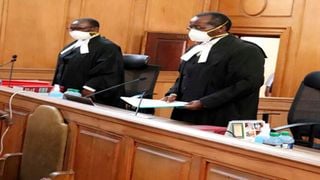
Court of Appeal president Daniel Musinga (centre) with Justices Roselyn Nambuye (left) and Hannah Okwengu on June 2 after giving directions on the Building Bridges Initiative appeal.
| File | Nation Media GroupNews
Premium
First win for BBI proponents as case starts
The Building Bridges Initiative (BBI) case at the Court of Appeal opened yesterday with the government securing its first win after the judges struck out part of an appeal filed by Nairobi lawyer Charles Kanjama.
The court said Mr Kanjama's appeal should be limited to the High Court's ruling that rejected his bid to join the legal battle on the proposed referendum that sought 74 amendments of the Constitution.
Justices Hannah Okwengu, Patrick Kiage and Francis Tuiyott ruled the court stated that Mr Kanjama's appeal should not be against the final judgment of the High Court that blocked the plan to change the Constitution. The three judges are members of the seven-judge bench that will start hearing the main appeal today.
Instead, the judges said the lawyer's appeal will be limited to the grounds relating to the failure by the High Court to give reasons for declining his application to join the petition as an interested party.
His appeal will also not be consolidated with four others filed by the Attorney-General, President Uhuru Kenyatta, the BBI secretariat and the electoral commission, which arose from the judgment of May 13. However, it will be heard separately on July 2 by the seven-judge bench.
Canvass
The judges noted that most of the grounds of appeal listed by Mr Kanjama relate to the High Court judgment in which he was not a party, the court having declined to have him enjoined.
“The High Court in its ruling rejected his application and he cannot now purport to go round the ruling of the High Court by canvassing the issues that he intended to canvass, but which he was unable to do, due to the order refusing to have him enjoined,” said the judges.
They added that the only issue that Mr Kanjama has raised concerning him in that judgment is the first ground where he states that the court failed to give reasons for declining to admit him in the proceedings.
Hence, it is only this issue that he can argue in his appeal against the disputed judgment in which the High Court declared that the Constitutional amendment bill was unconstitutional.
The appellate court was ruling on applications filed by the Attorney-General and the Independent Electoral and Boundaries Commission (IEBC) seeking to have Mr Kanjama's appeal struck out entirely for being incompetent.
They told the court that because the lawyer was not a party at the High Court stage of the dispute, his participation at the appellate court is improper.
Signature verification process
Mr Kanjama’s quest to join the petition at the High Court was premised on an argument that he was acting in the public interest to challenge IEBC’s signature verification process.
He had argued that IEBC did not educate the public on how to confirm their details, making it difficult for many Kenyans to use its online system to verify their data and whether their details had been illegally used to endorse the referendum bill.
But the judges declined his request and in his appeal he faulted the High Court for failing to give sufficient reasons for their decision.





